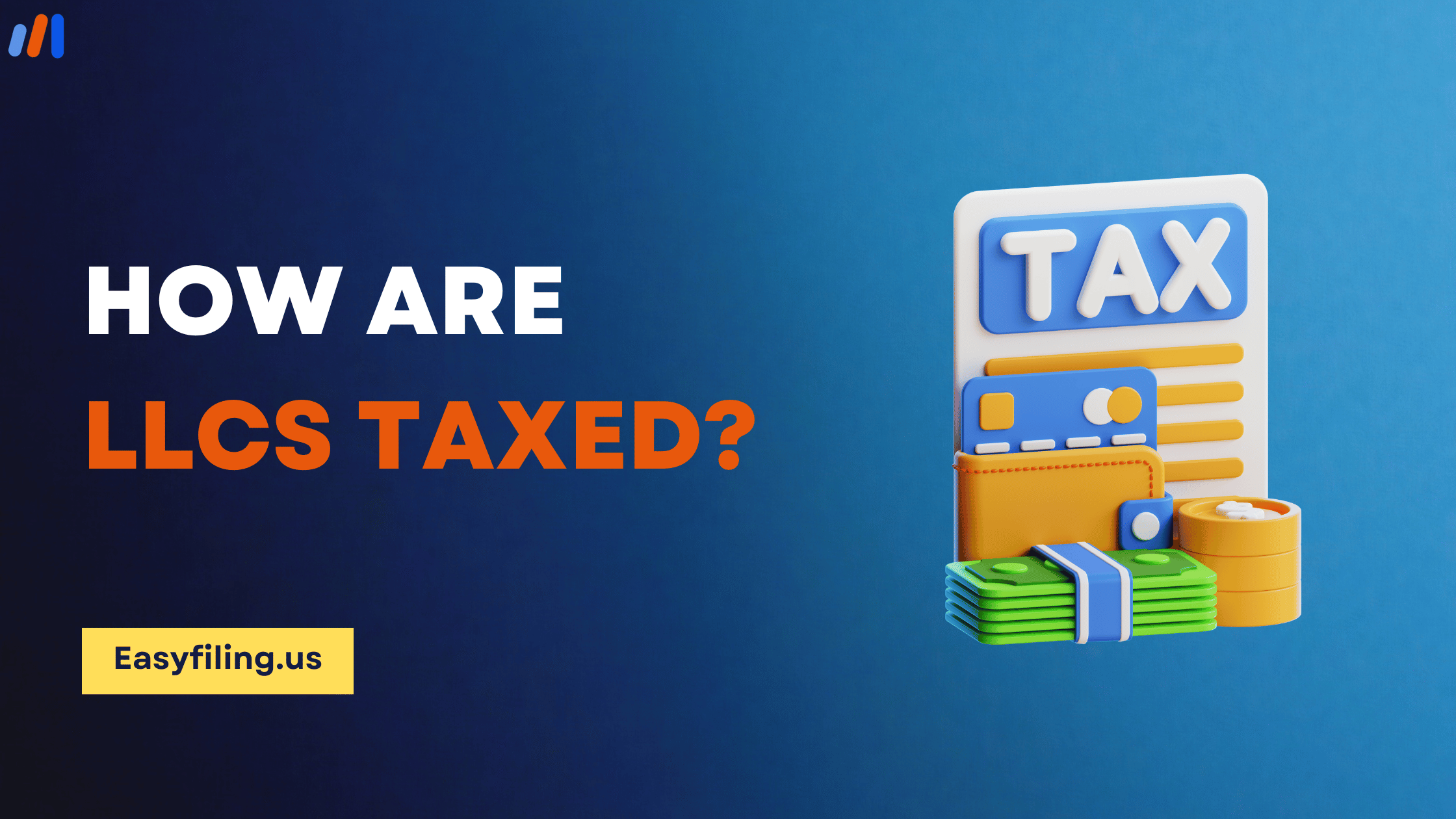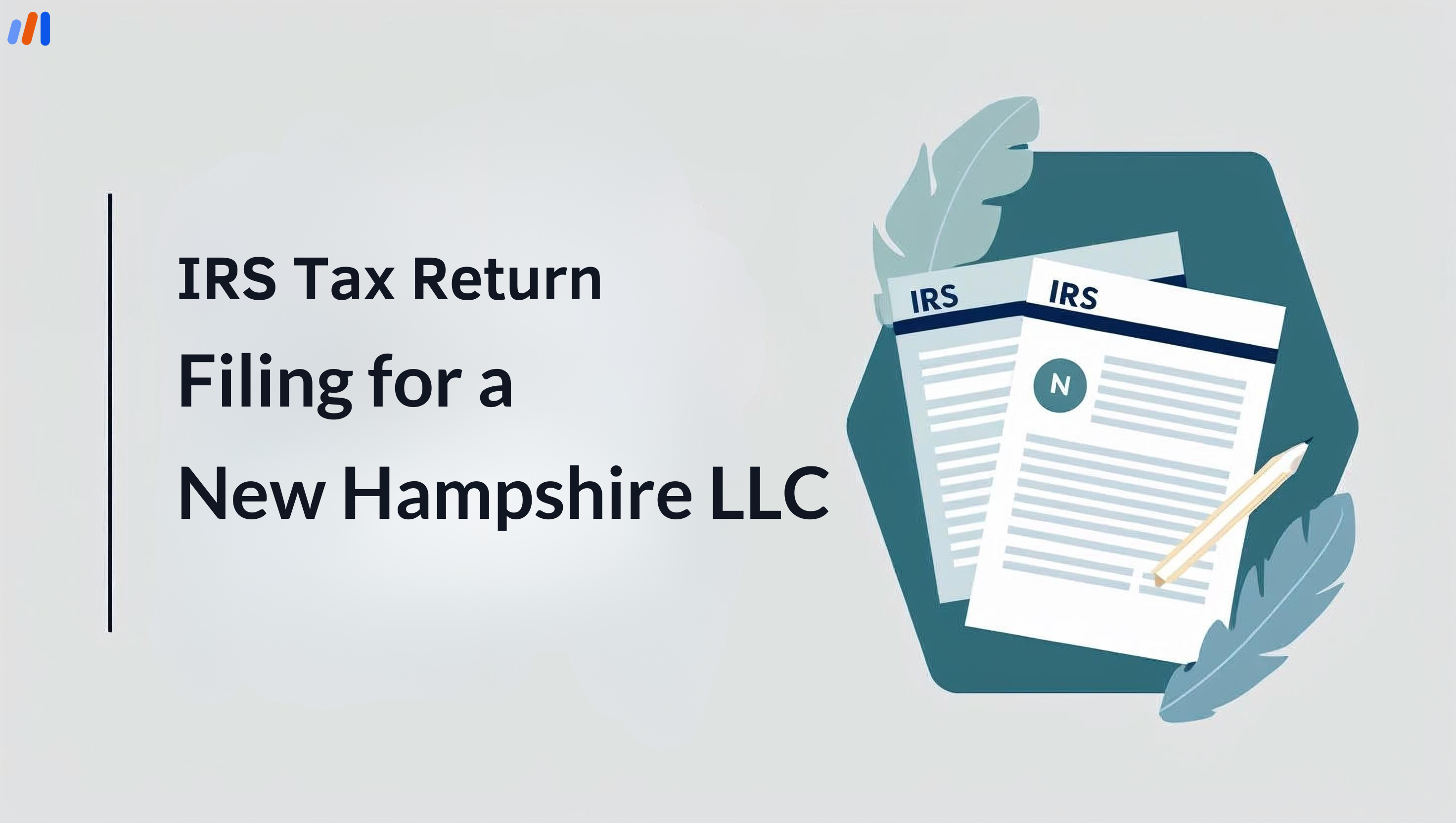It is understandable that when you want to start a business, you may be worried about various things, and taxes may be among them. No worries. It is ascertained that Limited Liability Companies (LLC) are one of the most popular forms of business entities because of tax flexibility and personal liability protection.
In this article, we’ll explain how are LLCs taxed and how to use different tax classifications for tax purposes so that you can efficiently run your business.
What is an LLC?
An LLC also known as a limited liability company is a common form of doing business in the USA, due to its inherent ease and flexibility with which it can be used. It bears the features of both corporations and partnerships. An LLC shields its owners also known as members from the debts of the business. This means they are not personally responsible for the firm’s debts or lawsuits.
This structure offers flexibility in management and tax treatment; owners can choose to be taxed as a sole proprietor, partnership, or even corporation.
What are LLC Tax benefits?
Pass-Through Taxation: Perhaps the most distinct feature in the taxation of LLCs is pass-through taxation. This means that the profits earned are not taxed at the level of the LLC. The profits as well as losses are deflected to the individual owners also known as members who are supposed to declare it in their tax returns within the specified tax year. This addresses one of the problems associated with corporations which is double taxation.
Flexibility in Profit Distributions: When it comes to distributions of the income of the company, LLCs do not have to follow the basic proportional distribution of the profit to equity holders of the company. This can make members contribute more to the business and still not lose the return relative to a subordinate ownership position.
Self-Employment Tax Savings on Activeness: These practices may leave room for self-employment tax savings, taking into consideration the nature made by and the structure of the LLC. In most cases, LLC members are allowed to treat part of their earnings as distribution and this will escape the self-employment tax.
No Double Tax Taxes: One of the reasons C-corporations do not appear largely favored is due to the presence of double taxation as shareholders pay tax on corporate income tax when dividends are paid out. However, LLCs mostly avoid double taxation as they pass income to their members.
State Tax Advantages: Several states have tax advantages that are meant for LLCs only, examples like tax credits & or exemptions. These can be very different depending on the state; therefore, owners of an LLC need to check the laws that dominate their state of establishment.
Types of LLCs in the United States

1. Default Taxation for LLCs
An LLC, by default, is not considered a separate tax entity by the IRS. Instead, it pays taxes on the number of its members;
Single-Member LLC (SMLLC):
Taxed as a Disregarded Entity: The IRS treats a single-member LLC as a separate entity for tax purposes. Here, all income and expenses from the business are included in the tax files of the member in the case of Form 1040, Schedules C, E, or F. This makes the acquisition of tax returns easier for the owner since the income of the LLC is handled as that of an individual.
Self-Employment Taxes: The member has a liability to pay self-employment tax for taxes on the net income earned by the LLC. This in particular is social security and Medicare taxes which may be a big worry for owners of single-member LLCs.
Multi-Member LLC:
Taxed as a Partnership: Given the above, the IRS does not distinguish multi-member LLCs from partnerships. As a rule COB tax, the multi-member LLC exists free of federal income tax. Instead, earnings and losses are passed on to the members following their relative percentage ownership in the LLC therefore financial burdens as well as advantages are proportionate.
Form 1065 U.S. Return of Partnership Income: The LLC files an information return, and each member is issued a Schedule K-1, which outlines income and the respective share of deductions. Members then use this information in bringing the item within their returns to prevent tax leakage on income.
How Self-Employment Taxes Work: Similar to a single-member LLC, members of a multi-member LLC are also self-employed and are obliged to pay self-employment taxes on their distribution share which is essential for Social Security and Medicare taxes.
2. Opting for Corporate Taxation
LLCs also opt for corporate taxation by applying with the IRS using Form 8832. There are two primary forms of taxation that an LLC can opt for:
C Corporation:
An LLC chooses to be taxed as a C corporation; then there will be payment of corporate taxes at the entity level. This means that Form 1120 (U.S. Corporation Income Tax Return) will have to be filled in and this states that the LLC will be liable for all tax requirements and any associated obligations devoid of the members.
Double Taxation: The money that is earned is going to be taxed twice, once at the company level and then when it is distributed as a dividend to the owners. It may be a negative thing, particularly for the small businesses. However, others may prefer this approach as a strategy for example when sourcing for funds or future expansion.
The C corporation option more advantageously suits some companies for tactical purposes such as retaining and operating profits within the company rather than distributing them as dividends, or in anticipation of tax incentives related to deductions and credits applicable to C corporations.
S Corporation:
An LLC can join the S corporation tax model by filing the 2553 Form on the IRS website. This enables the LLC to keep flowing through taxation slashing the tax liabilities of self-employment taxes associated with partnerships.
Unlike a C corp, an S corp is not a C corporation and provides pass-through treatment whereby income is taxed at the level of the member. The member can pay himself a reasonable salary which attracts payroll tax, while the profits remaining after salary and other expenses can be taxed in the form of dividends, which do not attract self-employment tax, this reduces the tax exposure of the members.
3. Taxation for Non-Resident Owners of LLCs
Non-resident owners of U.S. LLCs have different tax obligations. By nature, they are deemed to be treated as either a disregarded entity or a partnership. However, as a flow-through entity, the non-resident members are still obligated to file a return against the US source income using Form 1040-NR.
U.S. LLCs having foreign members are in most cases subject to withholding tax on some categories of income paid to foreign member representatives which do not normally exceed 30% but may bypass tax if relevant treaties are entered into. This is put in place so that foreign members will still be remitting some taxes to the US even if they don’t live there.
4. Taxes Related to a State
State Income Taxes: Some states will levy taxes on LLCs and other business entities, while some do not. They focus rather on the taxation of members only. This can have serious consequences concerning the net income retained by the LLC and its members.
Franchise Taxes: Many states, for example, California and Texas, levy what is known as franchise tax or annual charges for LLCs or other forms of business organizations. Such charges are paid in addition to income tax and are upon certain specified criteria such as the revenue or capital of the LLC to augment the revenue of the state in addition to services and other development.
5. Sales and Employment Taxes
Besides that, in case an LLC has goods or services, it is possible that it would be the intimate server of sales taxis in places where it operates. Employment taxes must be paid if the LLC has employees where payroll taxes (federal and state) are part of the equation. This includes social security, medicare, and unemployment taxes which will play an important role in upholding the rights and benefits of employees.
6. Tax Relief To LLC
An LLC is permitted to claim a few types of business expenses, such as administrative costs, staff payments, and medical benefits. Moreover, they can utilize certain deductions such as the QBI deduction where members can deduct 20% of their qualified business income. By making this deduction, LLC members can generate huge tax benefits hence promoting expansion and growth within the LLC.
How can an LLC cut down on taxes?

There are many strategies that Limited Liability Companies (LLCs) can employ to decrease their tax obligations effectively. Following are some important strategies:
Claim Business Expenses: The members of an LLC can decrease their income tax further by taking deductions for normal business expenses which are ordinary and necessary. These include such expenses as rent, power bills, stationery, and even reasons concerning business travel which reduces the gross income.
Utilize the Qualified Business Income (QBI) Deduction: This annual deduction provided for owners of LLCs enables them to choose to deduct as much as 20% from their qualified business income. This deduction aims to promote small businesses which can dramatically decrease tax liability for qualifying LLCs.
Make Use of Health Insurance Premiums: Medical insurance deductible premium expenses incurred by the members of the LLC by insuring the members’ health tend to enhance such accounts’ income which is subject to tax.
Employ Contributions into Retirement Plans: The participants of the LLC can also make use of their taxable income by contributing to retirement plans such as SEP IRAs. These retirement payments are generally deferred making one save right away on paying taxes.
Elect S Corporation Status: Since their income is not subjected to self-employment taxes in this case, S Corporation elections may help an LLC to avoid such taxes on part of its income. This can result in big savings in taxes although it is very crucial to consider the advantages and disadvantages of doing this with a tax expert.
Conclusion
An LLC can be a default pass-through or a corporation that elects how it is taxed and this is dependent on the choice of the LLC owners. Tax treatment should be at the top of the checklist of considerations of any LLC owners but especially the taxation of the LLC about their circumstances.
Most LLCs seek the advice of a tax specialist to know how best they can minimize taxes paid while ensuring that there is tax compliance at both the federal level and state levels. Proper planning of this nature and practice may encourage the growth and development of the LLC financially.
Frequently Asked Questions (FAQs)
Is there any state-specific taxation for LLCs?
Yes, a few states have those original taxes imposed solely on LLCs, for instance, franchise taxes or annual fees which are not part of taxes at the federal state. These conditions can differ from state to state; thus, it is emphasized for LLCs to follow up on local norms.
What are the taxes incurred by its members in an LLC?
LLC members must pay self-employment taxes on their share of the profits of the LLC. Self-employment taxes include both Social Security and Medicare taxes. Moreover, depending on the earnings, members may also make estimated quarterly tax payments to avoid underpayment penalties.
Are LLC members entitled to dividends?
Generally, there is no distribution of dividends to members of an LLC, and rather, the profits that accrue therefrom are shared as distributions. Such distributions are included in individuals’ taxable income. The only exception is if an LLC opts for corporate taxation; dividends can be paid out in the same manner as other corporations.
File Your LLC Today
25$ off with a coupon
Lock in EasyFiling's transparent rates and get lifetime compliance support at no extra cost.
Get Started Now







